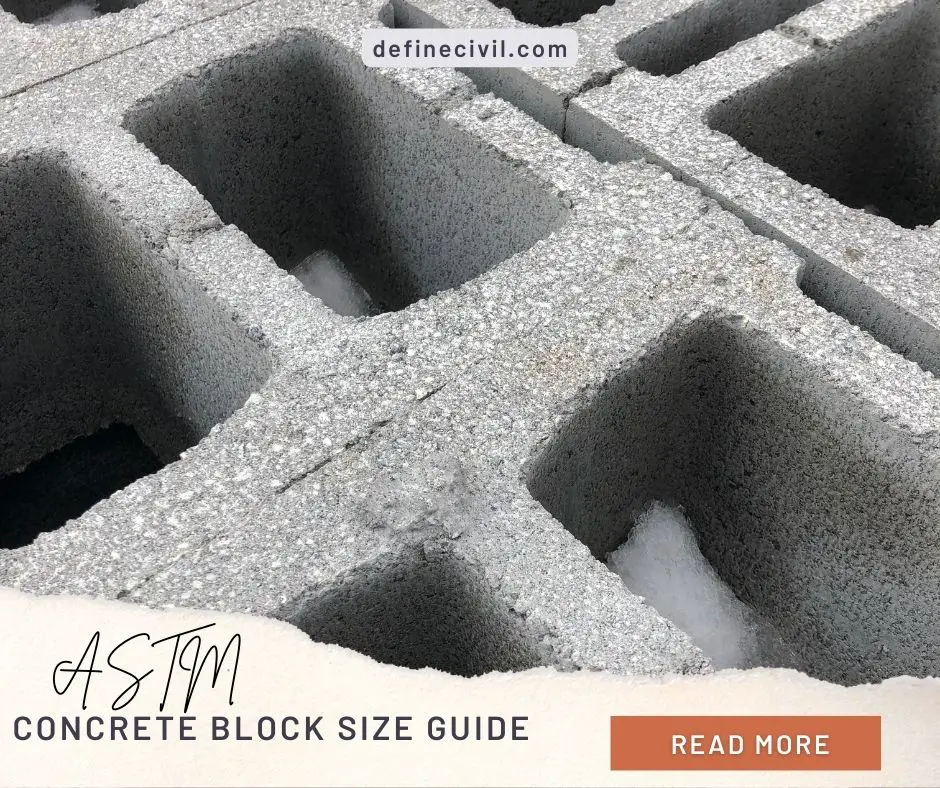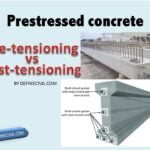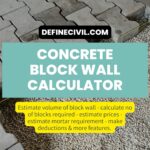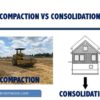The standard cinder blocks dimension most commonly used in United States is 8x8x16 in inches. That’s the nominal size and the actual specified size is less by 3/8 inches in thickness because of the mortar joint. The actual dimension is 7 5/8” x 7 5/8” x 15 5/8”.
In a typical 8x8x16 dimension of a cinder block the first figure represents the depth/width while the other two dimensions indicate height and length respectively. So, the face of a cinder block is 8 x 16 inches or 203 x 406 mm.
The thickness available is in the increment of 2 inches like 4, 6, 8, 10, 12, 14, and 16 inches. You can choose the size depending on the thickness of the wall required. However, if you want some custom or special dimensions for your project, you can ask the manufacturer to produce.
Introduction to sizes
A cinder is a by product or material left after burning of coal dust or fly ash. This by product is now used as a construction material and it provides good strength. The cinder is nowadays used as aggregate in concrete. It is also used in Masonry for making of concrete blocks.
Cinder blocks are used in masonry for construction of partition walls. Cinder blocks are available in various sizes based on ASTM standards.
Cinder Block dimensions
According to ASTM standards nominal dimension of concrete blocks are different while their standard dimension is different. For example, a concrete block of size 16” ×8” ×8” is a block of nominal dimension while its standard dimension is less than this dimension.
Must Read: Here’s a detailed guide about different type of CMU or concrete blocks that are used in construction of buildings. Types of Concrete Block used in Construction
Must Read
Cinder Block Nominal Dimension
A Nominal dimension of cinder block is that dimension which includes thickness of one mortar joint as well. For example, if we talk about 16” ×8” ×8” size then this is a nominal dimension of cinder block with mortar joint thickness in each dimension. This size is most common in use in USA, and it includes 3/8” mortar thickness in each side of block.
Cinder Block Standard Dimension
A standard dimension is the actual dimension of block which excludes the mortar thickness of 3/8”. For example, a cinder block of size 16” ×8” ×8” includes its mortar thickness while its actual size is 15 5/8” × 7 5/8” ×7 5/8”.
Also Read: How much does a cinder block weigh?
Cinder Block Size According to ASTM
According to ASTM a cinder concrete block is available in 4”,6”,8”,10”,12”. The most common concrete block size which is used for construction is 8” wide block of size 16” ×8” ×8”. Here’re some ASTM standards that you can refer to while working with concrete masonry unit (CMU block walls).
| Cinder Block Size | Nominal Dimension (Length X Depth X Height) | Standard Dimension (Length X Depth X Height) |
| 4” cinder block dimension | 16” ×4” ×8” | 15 5/8” ×3 5/8” ×7 5/8 |
| 6” cinder block dimension | 16” ×6” ×8” | 15 5/8” ×5 5/8” ×7 5/8 |
| 8” cinder block dimension | 16” ×8” ×8” | 15 5/8” ×7 5/8” ×7 5/8 |
| 10” cinder block dimension | 16” ×10” ×8” | 15 5/8” ×9 5/8” ×7 5/8 |
| 12” cinder block dimension | 16” ×12” ×8” | 15 5/8” ×11 5/8” ×7 5/8 |
Must Read: If you’re looking to use cinder blocks for foundation like stem wall, here’s a detailed guide about making block wall foundation and its requirements.
Must Read
ASTM C90 – Choosing the size of cinder block
- This standard reference is for concrete masonry unit that includes thickness for the minimum face shell as well as the web dimensions. You can choose the minimum size of cinder blocks from this reference on the basis of thickness of your walls.
- Tolerance: The standard allows for unit dimension (width, height, and length) to vary by as much as +/- 3/8 inches or 3.2 mm.
- Hollow and solid blocks – In case you choose the hollow core blocks, the net-cross-sectional area of a unit should be 75% of the gross cross-sectional area.
| ASTM DESIGNATION | TYPE OF CMU |
| ATSM C55 | Concrete Brick |
| ASTM C73 | Calcium Silicate Face Brick |
| ASTM C90 | Load Bearing Concrete Masonry Units |
| ASTM C139 | CMUs for construction of Catch Basins and Manholes |
| ASTM C744 | Prefaced Concrete and Calcium Silicate Masonry Units |
| ASTM C936 | Solid Interlocking Concrete Paving Units |
| ASTM C1372 | Segmental Retaining Wall Units |
ASTM C1634 – Concrete blocks compliance
This standard includes the standard specification for concrete facing brick. There’re different nominal lengths and heights available.
While the typical size of 4 inch or 102 mm is for veneer applications. (In veneer applications we use bricks just for concealing the wooden or steel frame as single layer or exterior layer).
If you go for core bricks, the core or hollow area must not be more than 25% of the gross cross-sectional area.
4” cinder Block dimension
4” cinder block is available in two different length 16” length or full-length block and 8” length or half length cinder block. The main purpose of these two sizes is to avoid breaking of blocks for completing a course of block and it saves an amount of material as well.
Must Read: If you want some tips about different shapes and textures of brick masonry, here’s a detailed guide. Brick masonry types and shape or patterns.
Must Read

4” Cinder full block dimension
This cinder block is commonly available for construction and its size is 16” ×4” ×8”. This is a nominal size of cinder block of 4”. While its standard dimension is obtained by subtracting a mortar thickness of 3/8”. The actual dimension of 4” cinder block is 15 5/8” ×3 5/8” ×7 5/8”.
4” Cinder half block dimension
This cinder block is used to avoid breaking of blocks for completing a course of masonry. The only difference between these two blocks is their length. The nominal dimension of this block is 8” ×4” ×8”. While its standard dimension is obtained by subtracting mortar thickness from each side. The actual dimension obtained is 7 5/8” ×3 5/8” ×7 5/8”.
6” cinder block dimension
6” cinder block is also available in two different lengths. One is full block length of 16” and other is half block length of 8”.
6” Cinder full block dimension
The 6” block is also used for construction. It is used for construction of wall of 6” thickness. The nominal size of this block 16” ×6” ×8”. While its standard size is obtained by subtracting mortar thickness from each side. The actual thickness of block is 15 5/8” ×5 5/8” ×7 5/8.
- Nominal dimension of 6” block= 16” ×6” ×8”
- Thickness of mortar joint= 3/8”
- Standard dimension of 6” block= (16”-3/8”) × (6”-3/8”) × (8”-3/8”)
- Standard dimension of 6” block=15 5/8” ×5 5/8” ×7 5/8
6” inch cinder block of half-length is also available, and it is used to complete course of stone masonry without breaking of stone blocks. The standard dimension of 6” inch cinder block of half-length is 7 5/8” ×5 5/8” ×7 5/8.
8” cinder block dimension
The 8” block is used for construction of wall of 8” thickness. The nominal thickness of this block is 16” ×8” ×8”. While standard dimension of this cinder block is 15 5/8” ×7 5/8” ×7 5/8”. This dimension is obtained by subtracting mortar thickness from each side of block.
- Nominal dimension of 8” block= 16” ×8” ×8”
- Thickness of mortar joint= 3/8”
- Standard dimension of 8” block= (16”-3/8”) × (8”-3/8”) × (8”-3/8”)
- Standard dimension of 8” block=15 5/8” ×7 5/8” ×7 5/8
8” cinder block of half-length is also available, and it is used at the end of course of block to complete it without breaking of full-length block. The standard dimension of 6” inch cinder block of half-length is 7 5/8” ×7 5/8” ×7 5/8.
10” cinder block dimension
The 10” block is also used for construction. It is used for walls of 10” thickness. The nominal size of this block 16” ×10” ×8”. While its standard size is obtained by subtracting mortar thickness from each side. The actual thickness of block is 15 5/8” ×9 5/8” ×7 5/8.
- Nominal dimension of 10” block= 16” ×10” ×8”
- Thickness of mortar joint= 3/8”
- Standard dimension of 10” block= (16”-3/8”) × (10”-3/8”) × (8”-3/8”)
- Standard dimension of 10” block=15 5/8” ×9 5/8” ×7 5/8
10” half cinder block is also available. The nominal dimension of this block is 8” ×10” ×8”. While its standard dimension is 7 5/8” ×9 5/8” ×7 5/8.
12” cinder block dimension
The 12” block is used for construction of wall of 12” thickness. The nominal thickness of this block is 16” ×12” ×8”. While standard dimension of this cinder block is 15 5/8” ×11 5/8” ×7 5/8”. This dimension is obtained by subtracting mortar thickness from each side of block.
- Nominal dimension of 12” block= 16” ×12” ×8”
- Thickness of mortar joint= 3/8”
- Standard dimension of 12” block= (16”-3/8”) × (12”-3/8”) × (8”-3/8”)
- Standard dimension of 12” block=15 5/8” ×11 5/8” ×7 5/8
12” half cinder block is also available. The nominal dimension of this block is 8” ×12” ×8”. While its standard dimension is 7 5/8” ×11 5/8” ×7 5/8. The half cinder block reduces the need to cut full block for completing course of blocks at construction site
Must Read: I’ve made a detailed guide about CMU wall, it’s construction process, different sizes of CMU blocks, and different shapes. You’ll find this guide pretty helpful. CMU wall Details
Must Read
Conclusion
According to ASTM standards the cinder blocks are available in different sizes. The cinder blocks are identified by their nominal size. The nominal size includes mortar thickness on each side. While standard dimension of block is 3/8” less than nominal dimension.

















